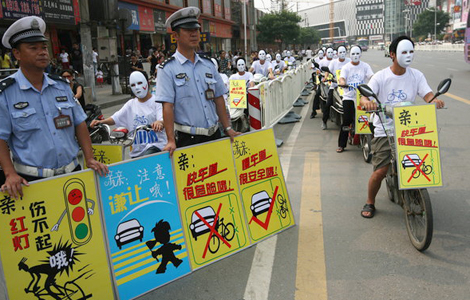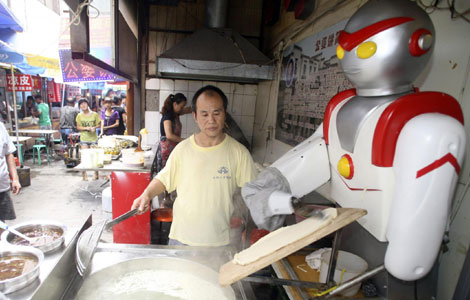Slower high-speed trains receive lukewarm welcome in
Updated: 2011-08-11 18:31
(Xinhua)
|
|||||||||||
BEIJING - The State Council's decision to slow the operational speeds of China's high-speed railways on Wednesday was met with a tepid welcome by most Chinese after last month's fatal train collision raised concerns over the country's fast-growing high-speed rail sector.
The State Council, or China's cabinet, ordered safety checks on high-speed railways, as well as slower operational speeds, at an executive meeting presided over by Premier Wen Jiabao in the wake of July's deadly bullet train crash.
The safety of the high-speed railways was questioned after high-speed trains on a line near the eastern city of Wenzhou collided on July 23. The incident has been blamed on faulty signaling equipment.
The slower train speeds made headlines across the country, but many people expressed mixed feelings about the decision.
Zhou Yiwen, an employee of Hunan Tangel Publishing Co. Ltd., wrote on his microblog: "I feel a little relieved and I have faith in the government's measures. I hope it is not too late to fix the problem."
"It is good news, since I would feel safe with a slower train. But I do hope that they (the Railway Ministry) can rule out the hazards so that tragedies like this will not happen again," said a Beijing taxi driver surnamed Li.
Sun Zhang, a professor at the Railway and Urban Mass Transit Research Institute of Tongji University, said he supports the new policy.
"We should take time to test the high-speed rail system and accumulate more experience, as this will provide an important reference for the future operation of the trains at higher speeds, " Sun said.
"It took Japan 47 years to increase the speed of its Shinkansen railway network, going from 210 km per hour in 1964 to 300 km per hour in 2011. It is therefore impressive, yet worrisome, that China managed to achieve speeds of 350 km per hour in just seven years," Sun added.
However, there are also those who doubt that slower speeds will make a difference.
"I don't think it will work, as the actual cause of the collision is unknown. We don't know if the train speed had anything to do with the collision, so slowing the speed of the trains is like barking up the wrong tree," a netizen using the screenname "dayushuomanhua" said in a microblog post.
Sheng Guangzu, the Minister of Railways, said that railways with a maximum speed of 350 km per hour (kph) will run at 300 kph, while those with a maximum speed of 250 kph will run at 200 kph. He added that railways whose speeds have been lifted to 200 kph will be slowed down to 160 kph.
Ticket fares will be reduced accordingly, he said.
Amid the doubts being raised about the reduced train speeds, there are also others who hope that the train speeds will be increased in the future.
A netizen using the screenname "yuanlianqishi" said in a microblog post: "I hope slowing the trains will be a temporary thing. I think after better safety measures and personnel training are implemented, the train speeds will increase again."
A Thursday editorial in the Beijing News stated "it is a trend of the times and the aspiration of the people to develop high-speed railways, but what people need are safe trains with affordable fares and quality service."
Sheng said the collision exposed holes in the safety and management of railway traffic, as well as a lack of experience in handling train collision incidents.
An investigation into the cause of the crash is still under way. Investigation results are expected to be released in mid-September, according to the team responsible for investigating the crash.
China began operating its bullet trains in 2007. By the end of 2010, 8,358 km of high-speed railways had gone into operation, ranking first in the world in terms of length.
According to the country's railway network development plan, which was revised in 2008, the total length of China's railways is expected to reach 16,000 km by 2020.
Related Stories
China cuts train speeds, ticket prices 2011-08-11 15:26
Bullet trains told to reduce speed 2011-08-11 15:25
Deliveries of new cars suspended following rail delays 2011-08-11 15:23
Train crash shakes confidence in train travel 2011-08-07 10:22
- China slows bullet trains to ensure safety
- Asian stocks follow Wall St dip
- Trade surplus rises on export surge
- Japan's PM signals he's ready to quit
- ROK, DPRK exchange artillery fire
- Cameron has lost legitimacy: Libya
- China puts brakes on bullet trains
- China's refitted aircraft carrier starts sea trial
Hot Topics
Anti-Gay, Giant Panda, Subway, High Speed Train, Coal Mine, High Temperature, Rainstorm, Sino-US, Oil Spill, Zhu Min
Editor's Picks

|

|

|

|

|

|







